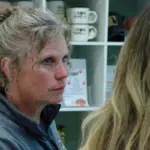by Lois Szymanski, photography by Nikola Tzenov
Alpaca Adventures
Travis and Yussy McManus Would Like To Introduce You To Black Barn Alpacas in Finksburg
Bright, expressive eyes draw you in. Then, you sink your hands into the softest fleece you have ever felt. A long, gentle neck wraps around you, and you are hooked. At Black Barn Alpacas in Finksburg, it doesn’t take long to fall in love with the alpaca’s whimsical charm and gentle demeanor.
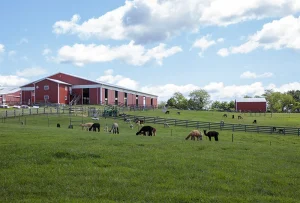 Nestled atop gently sloping green pastures and beautiful barns, this 50-acre farm owned by Travis and Yussy McManus offers an opportunity to meet alpacas and learn more about the camelid most often confused with llamas.
Nestled atop gently sloping green pastures and beautiful barns, this 50-acre farm owned by Travis and Yussy McManus offers an opportunity to meet alpacas and learn more about the camelid most often confused with llamas.
“The inception began in 2020 as a pandemic baby,” Yussy shares. “We were closing down a construction company we ran together in Texas and were brainstorming our next steps. We both came from farm and animal backgrounds and knew we wanted a sustainable animal project. When alpacas came into the conversation, my husband jumped in headfirst.”
First, Travis read everything he could find and began volunteering at an alpaca ranch to learn more.
 “I ended up showing up two to three times a week to volunteer at an alpaca farm for about eight weeks,” Travis says. “Then, I invested in alpacas from [the owner]. She showed me how to take care of an alpaca, what medicines to give them and when and why they were needed.”
“I ended up showing up two to three times a week to volunteer at an alpaca farm for about eight weeks,” Travis says. “Then, I invested in alpacas from [the owner]. She showed me how to take care of an alpaca, what medicines to give them and when and why they were needed.”
He and Yussy knew they wanted to raise show-quality, genetically sound alpacas, but they also wanted to share alpacas with others through agritourism. Right away, Travis committed to nearly 30 alpacas.
“We ended up having a fall festival in Texas that first October, and we had nearly 20,000 visitors within the month,” Yussy says.

Agritourism fits the couple’s desire to educate the public on the animals they love.
They bought their Finksburg farm a year and a half ago, moving back to the state where she was raised — partly to be near family and partly to avoid the Texas heat.
The pair has about 115 alpacas but expects to reach 150 by next year. Their focus is on producing show-quality alpacas, although Yussy says they also have some as pets because they love the animals so much.
While she stroked the neck of a sweet silver-gray alpaca named Sky, Travis knelt to wrap his arm around a rose-gray alpaca lying down nearby.
“My husband says, ‘Can you believe people actually treat alpacas like animals?’” she says with a laugh. “And sometimes I tell him, ‘If you sell that one, I am going with it!’”
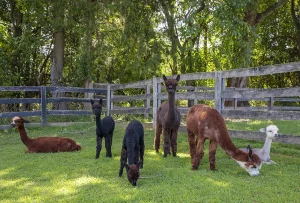
Travis says that Black Barn Alpacas’ breeding program is genetically sound, with breeding stock from across the country. He scours the options, looking for the best. As a result, all of their adult animals have placed high when showing nationally. Their herd exhibits most of the 22 varieties of color in alpacas, but Yussy and Travis say they are breeding for rose-gray, silver-gray and true black.
“True black is the rarest of all colors,” Yussy says. “We were one of the first farms to start genotyping animals to strive for more accuracy with color.”
Travis further explained the science and why it matters.
“Genotyping tells us about dilutions, colors that are dominant and what colors are likely to be produced by each animal,” he says. “The Histogram is a fiber-related report we also get. We’re looking for the fibers that go into high-end designer products.”
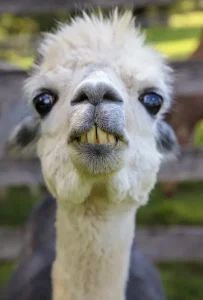 Yussy spread apart the hair on the back of a nearby alpaca, exposing crinkly soft fibers.
Yussy spread apart the hair on the back of a nearby alpaca, exposing crinkly soft fibers.
“We breed for this,” she says of the evenly crimped hair. “We like tighter frequency fiber, and we breed accordingly. It used to be that everyone looked for a good quality white that was easy to dye. But now, you see more interest in those natural colors. True black is amazing. There is no reflection, which means you can hardly see depth when photographing a true black animal. You almost have to see them in person.”
The farm sends fleece samples out for Histogram reports, ensuring they are on the right track with their breeding program. Yussy and Travis breed for wool, color and personality, but they say their alpacas’ health, happiness and well-being are always at the forefront.
“We never want them stressed. That gives us friendly, happy alpacas,” Yussy says.
With customers from Vermont, New York, Virginia, Tennessee, North Carolina and other states, Yussy says they vet every buyer to ensure their animals go to good homes.
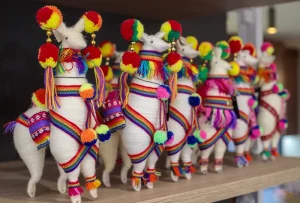 One of the thrills of raising alpacas comes when a new baby is born. An alpaca carries a baby for about 11 ½ months, one baby at a time, weighing 10 to 25 pounds at birth.
One of the thrills of raising alpacas comes when a new baby is born. An alpaca carries a baby for about 11 ½ months, one baby at a time, weighing 10 to 25 pounds at birth.
“I try to be there for every birth,” Travis says. “You never know when they will need help. We watch the newborn afterward — from their belly buttons and their first poop — to how long it takes until they stand. We want them up and drinking within 90 minutes.”
Herd health is of the utmost importance. The couple does a herd check of every alpaca every 30 to 40 days, from nose to toes. Their farm manager helps them dose each alpaca with Ivermectin to control worms and skin parasites. They get quarterly fecal checks, and manure is picked up daily to keep living areas clean. They eat palatable soft grass or non-stemmy hay.
 “There are only a few hundred thousand alpacas in America today,” Travis says. “You can no longer buy them out of Peru.”
“There are only a few hundred thousand alpacas in America today,” Travis says. “You can no longer buy them out of Peru.”
In August, Black Barn hosted a sold-out Alpaca Story Time, with 60 visitors.
“A bunch of little kids come. We tell stories, sing songs, feed alpacas and learn about them,” Yussy says. “We can curate any event here. We have a Peruvian Andes scheme since that’s where alpacas come from. Our event coordinator makes it happen.”
She spoke about the online shop the couple hopes to open soon, offering yarns, felted soaps and more. Felted soap starts with a good bar of soap wrapped with a second or third cutting of fleece felted by hand.
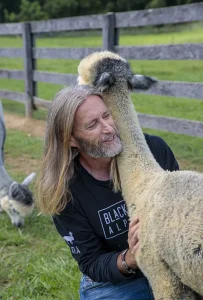 “It’s like having soap with a built-in loofa,” Yussy says. “It’s hypoallergenic and has all these nice qualities that keep your soap clean.”
“It’s like having soap with a built-in loofa,” Yussy says. “It’s hypoallergenic and has all these nice qualities that keep your soap clean.”
“When you come here, you leave with a smile,” Travis says. “It’s about peace of mind. During a tour, we educate on alpacas. You meet them in person, and then for 40 to 45 minutes, you are free to walk in and out of the fields to feed and pet animals. There’s a lot of freedom.”
Travis talked about the transformation he sees in some kids, from nervous and unsure to confident and smiling.
“Our alpacas are friendly,” Yussy says. “They might nose boop you for a pet or attention. People are invited to bring a blanket and a picnic to our tours and events and to spend time with them.”
The farm hosts three tours a day on Thursday, Friday and Saturday, and two tours a day on Sunday. Tour times change with the seasons. Learn more at BlackBarnAlpacas.com.










